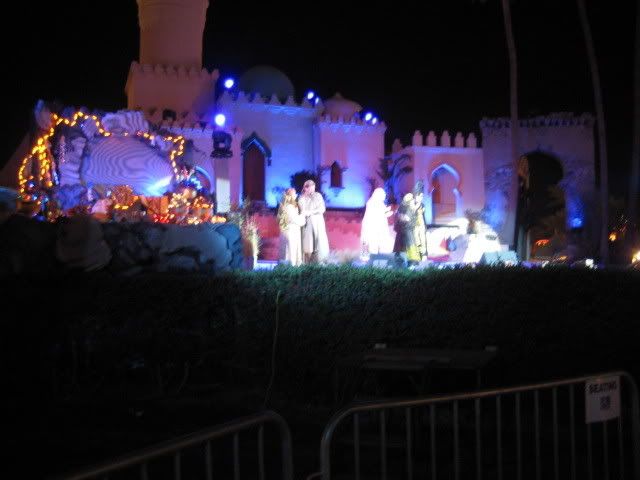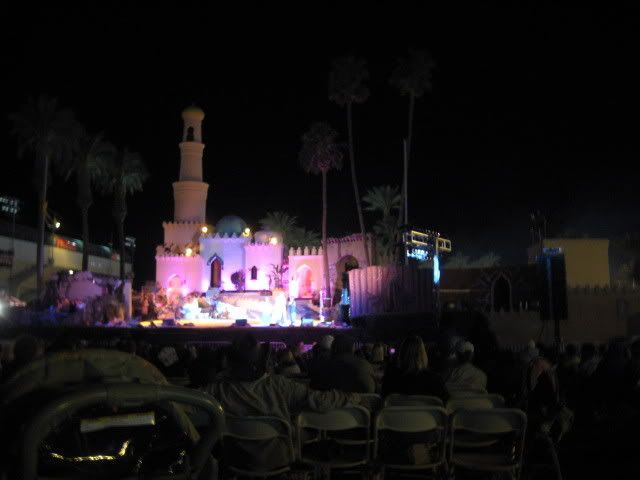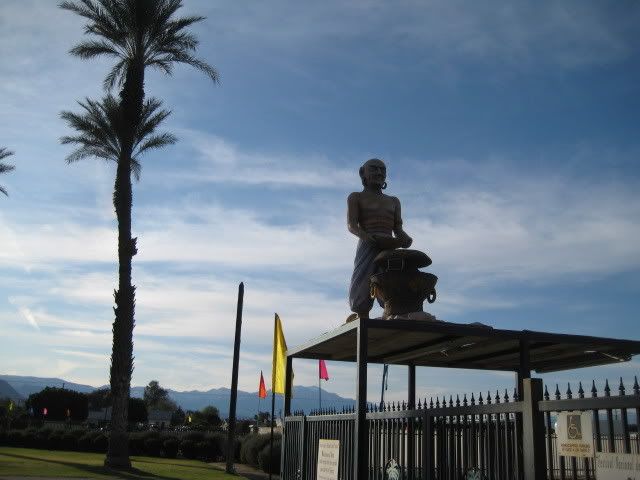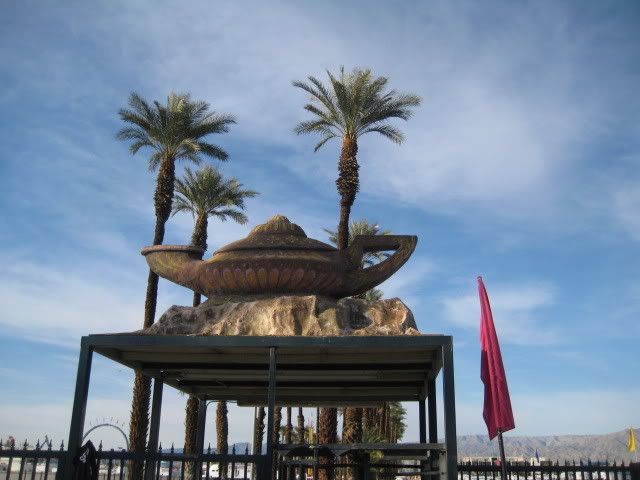1001
Directed by Kim Rubinstein
tickets and more information at:
http://theatre.ucsd.edu/season/1001/
A potent, passionate, funny, kaleidoscopic re-imagining of the classic Arabian Nights. Nationally celebrated playwright Jason Grote's politically charged theatrical maze explores current Middle Eastern tensions as it shifts back and forth and through mythic Arabia and modern-day New York City.
About the author:
Jason Grote's plays include 1001 (Denver Center world premiere, Page 73, Theater @ Boston Court, Contemporary American Theater Festival, Mixed Blood), Box Americana, Darwin's Challenge, Hamilton Township (Salvage Vanguard Theater world premiere; upcoming, Soho Rep), Maria/Stuart (Woolly Mammoth Theater world premiere; upcoming, Theater Schmeater), and This Storm Is What We Call Progress (Rorschach Theater world premiere). He is currently working on the screenplay for What We Got: DJ Spooky's Quest for the Commons and co-hosting The Acousmatic Radio Theater Hour on WFMU (91.1FM in NY/NJ, around the world at wfmu.org).
He has been published by Samuel French, Playscripts Inc., and in The Back Stage Book of New American Short Plays 2005 (edited by Craig Lucas), and his draft manuscripts are archived at the Lincoln Center/Billy Rose branch of the NYPL. He has received commissions from ACT (Seattle), Clubbed Thumb, The Denver Center, Ensemble Studio Theater, The Keen Company, and The Working Theater. Honors include an Ovation Award from The Denver Post; the P73 Fellowship; nominations for The Pushcart Prize, The Kesselring Prize, and The Weissberger Award; and "Best New Play" (for 1001) from Denver's alternative weekly, Westword. 1001 was also included in critics' year-end top ten lists in Time Out New York, The Rocky Mountain News, and The Boulder Daily Camera, and nominated for "Best Production of 2008" by L.A. Weekly. He is a member of PEN, New Dramatists, and Soho Rep's Artist Advisory Committee, and a contributor to Comedy Central's "Indecision 2008" blog. Visit him at jasongrote.com.
About the Director:
Prior to UCSD, Kim Rubinstein was the Associate Artistic Director of the Long Wharf Theatre where she directed Guys and Dolls, A Midsummer Night’s Dream, Private Lives, Santaland Diaries and The Cocktail Hour. Other recent directing credits include The American Plan for The Old Globe, The Intelligent Design of Jenny Chow for Portland Center Stage and San Jose Repertory Theatre, and Much Ado About Nothing and Romeo and Juliet for Shakespeare Santa Cruz. Some other directing credits: Romeo and Juliet, MacBeth and Julius Caesar (Chicago Shakespeare Theatre), The American Plan and Eloise and Ray (Roadworks Productions), Pan and Boone (Running With Scissors), Love’s Labour’s Lost (Next Theatre), Not I, (Bucket O’Beckett Festival), Act without Words I, Not I, Play, Come and Go, Baby With the Bathwater and Sarita (Berkshire Theatre Festival). Here at UCSD she directed Balm in Gilead and 1001. Kim was the Associate and Tour Director of the national tour of Angels in America.
Her other teaching credits include ten years on the acting faculty at Northwestern University, Brown/Trinity Consortium, Wesleyan University, University of Chicago, Eugene O’Neill Theatre Center, Teatro degli Stracci, and an ongoing gig with the professional School at Steppenwolf.
Ms. Rubinstein is a recipient of the TCG/NEA directing fellowship and was nominated for the Alan Schneider Directing Award, among other directing and teaching awards. Active in the development of new plays, she has done readings and workshops at places like New Dramatists and the Long Wharf.
cast:
Rebecca Lawrence – A
Anne Stella – B
Hugo Medina – C
Zoe Chao – D
Daniel Rubiano – E
Adam Arian – F
Naqiya Ebrahim – Dancer
Justin Gines – Dancer
creative:
Director - Kim Rubinstein
Production Stage Manager - Deirdre Rose Holland
Scenic Designer - Rob Tintoc
Costume Designer - Allison Crutchfield
Lighting Designer - Stephen Siercks
Sound Designer - Toby Jaguar Algya
Choreographer - Rebecca Salzar
Asst Director - Jeffrey Wienckowski
Asst Stage Manager - Cate O’Brien
Asst Scenic Designer - Max Lee
Asst Costume Designer - Shamira Turner
Asst Lighting Designer - Sarah Kranz
Dramaturg - Rana Salimi-Ghezelbash
Voice & Dialect Coach - Eva Barnes
Production Assistant - Tiffany Fontaine
performances:
Thu, Feb. 26 at 7:00pm PREVIEW
Fri, Feb. 27, 8:00 pm OPENING
Sat, Feb 28, 8:00 pm
Wed, Mar 4, 8:00 pm
Thu, Mar 5, 8:00 pm
Fri, Mar 6, 8:00 pm
Sat, Mar 7, 2:00 pm MATINEE
Sat, Mar 7, 8:00 pm CLOSING
Located at:Mandell Weiss Forum STUDIO
Limited Seating and No Late Seating
Parking Passes Required: Monday through Friday. Weeknight passes are $2 per vehicle from the vending machines located in the UC San Diego Theatre District/La Jolla Playhouse parking lots and entry display case. Please remember your parking space number. You will need it to purchase your parking pass.
Note: Machines take all major credit cards except Discover and when paying with cash you must use exact change, NO CHANGE GIVEN.
Parking Passes Not Required: Saturdays and Sundays
http://theatre.ucsd.edu/places/parking.html
Cars without permits are subject to ticketing by UCSD Campus Police. The Theatre & Dance Department does not have the authority to waive and cannot pay parking tickets.
General Admission: $20
UCSD Faculty/Staff and Seniors (over 62): $12
UCSD Students/UCSD Alumni Association (with ID): $10
*Preview performance on Thursday, Feb. 26th at 7:00pm is offered at the reduced ticket prices of $15/$10/$8
Advance tickets for this production are available Monday-Friday, noon to 6 pm by calling the Box Office at 858.534.4574 or in person at the Theatre District’s Central Box Office at the Sheila & Hughes Potiker Theatre.
At-the-Door tickets, if available, can be purchased one hour before show time at the performing theatre’s box office at Mandell Weiss Forum STUDIO
Thursday, February 26, 2009
Tuesday, February 24, 2009
Free Articles on the 1001 Nights
I'd like to compile a list of scholarly/academic articles on the Nights available online and for free and without having to have a University account. I'll add to this post as I find them so bookmark this link if you're interested.
I think with Google Books and archive.org the future of scholarship/research is heading in this direction - not sure how it's all going to work out though (ie university press books / obscure journals having info for free vs. having to have a university pay for access or having a non-affiliate having to pay upwards of $100s of dollars for a slim book of essays).
In any case, feel free to email me others and I'll keep posting all of the links here for an e-bibliography type experiment.
Beaumont, Daniel. "Alf Layla wa Layla or The 1001 Nights." Introduction from his book on the Nights which focuses on psychoanalytic theory and Lacanian elements: Slave of Desire: Sex, Love, and Death in the 1001 Nights. http://www.arabiannights.org/beaumont.html
Bochman, Victor. "The Jews and 'The Arabian Nights.'" Ministry of Foreign Affairs, Israel, 1996. http://www.mfa.gov.il/MFA/MFAArchive/1990_1999/1998/7/The%20Jews%20and%20The%20Arabian%20Nights
Borges, Jorge Luis. "The Thousand and One Nights." The Georgian Review (Fall 1984): 564-574. Link: http://www.geocities.com/tidbits4you/ArabianNights.Borges.html (Anyone have further info on this journal? I can't seem to find it anywhere).
Google Books has a copy of the essay as well, here: http://books.google.com/books?id=ty8LLZ_U93MC, from the book "Seven Nights" if you are looking for a proper citation for it.
Brinton, John. "The White Lines and the Black." Aramco, 1968. Note: About the wood engraver William Harvey, artist for Lane's Nights. http://www.saudiaramcoworld.com/issue/196801/the.white.lines.and.the.black.htm
Bruns, Rebecca. "Arabian Nights - and Art Nouveau." Aramco World, 1979. http://www.saudiaramcoworld.com/issue/197904/arabian.nights.-.and.art.nouveau.htm
Grotzfeld, Heinz. "The Age of the Galland Manuscript of the Nights: Numismatic Evidence for Dating a Manuscript?" 1995 Lecture. http://www.uib.no/jais/v001ht/01-050-064grotz1.htm
Hattar, TS. "Arabian Nights Briefing." http://www.outreachworld.org/Files/Curriculum/arabian-nights-lesson.pdf
Kadivar, Darius. "More than Real: Hollywood's thousand and one nights." Article on some film versions of the Nights. http://www.iranian.com/DariusKadivar/2002/November/1001/index.html
Mazzawi, Rosalind. "Scheherezade in Paris." Aramco World, 1985. Note: About a Parisian Art Exhibit in the 1980s. http://www.saudiaramcoworld.com/issue/198505/scheherezade.in.paris.htm
Obojski, Robert. "The Return of Scheherezade." Aramco World, 1977. Note: this article is about Nights related stamps. http://www.saudiaramcoworld.com/issue/197705/the.return.of.scheherezade.htm
Ouyang, Wen-chin (2003). "Metamorphoses of Scheherazade in Literature and Film." Bulletin of the School of Oriental and African Studies, 66 (3). pp. 402-418. link: https://eprints.soas.ac.uk/3860/
Patel, Ismail. "The Oriental Gothic as misrepresentation of the East. Discussed with reference to Vathek, by William Beckford, and selections from The Book of a Thousand Nights and a Night, by Richard Burton." http://victorian.fortunecity.com/coldwater/439/oriental.htm
Ross, Jack. "A new translation of the Arabian Nights." Note: This is a great introduction to the English language versions of the 1001 Nights, a must read for anyone interested in the Nights at all: http://mairangibay.blogspot.com/2008/12/new-translation-of-arabian-nights.html
Wallace, Alfred Russel. "The Birds of Paradise in the Arabian Nights." 1904. http://www.wku.edu/~smithch/wallace/S615.htm
Online Bibliographies:
These aren't necessarily articles available online but rather collections of bibliographies online that you can see (and then go find the articles/books from there).
The Arabian Nights Bibliography compiled by Ulrich Marzolph. Link: http://wwwuser.gwdg.de/~enzmaer/arabiannights-engl-elektr.html.
Professor Jack Ross has an extensive Bibilography as well on his blog. Link: http://dinarzade.blogspot.com/2007/09/arabian-nights-bibliography.html.
I think with Google Books and archive.org the future of scholarship/research is heading in this direction - not sure how it's all going to work out though (ie university press books / obscure journals having info for free vs. having to have a university pay for access or having a non-affiliate having to pay upwards of $100s of dollars for a slim book of essays).
In any case, feel free to email me others and I'll keep posting all of the links here for an e-bibliography type experiment.
Beaumont, Daniel. "Alf Layla wa Layla or The 1001 Nights." Introduction from his book on the Nights which focuses on psychoanalytic theory and Lacanian elements: Slave of Desire: Sex, Love, and Death in the 1001 Nights. http://www.arabiannights.org/beaumont.html
Bochman, Victor. "The Jews and 'The Arabian Nights.'" Ministry of Foreign Affairs, Israel, 1996. http://www.mfa.gov.il/MFA/MFAArchive/1990_1999/1998/7/The%20Jews%20and%20The%20Arabian%20Nights
Borges, Jorge Luis. "The Thousand and One Nights." The Georgian Review (Fall 1984): 564-574. Link: http://www.geocities.com/tidbits4you/ArabianNights.Borges.html (Anyone have further info on this journal? I can't seem to find it anywhere).
Google Books has a copy of the essay as well, here: http://books.google.com/books?id=ty8LLZ_U93MC, from the book "Seven Nights" if you are looking for a proper citation for it.
Brinton, John. "The White Lines and the Black." Aramco, 1968. Note: About the wood engraver William Harvey, artist for Lane's Nights. http://www.saudiaramcoworld.com/issue/196801/the.white.lines.and.the.black.htm
Bruns, Rebecca. "Arabian Nights - and Art Nouveau." Aramco World, 1979. http://www.saudiaramcoworld.com/issue/197904/arabian.nights.-.and.art.nouveau.htm
Grotzfeld, Heinz. "The Age of the Galland Manuscript of the Nights: Numismatic Evidence for Dating a Manuscript?" 1995 Lecture. http://www.uib.no/jais/v001ht/01-050-064grotz1.htm
Hattar, TS. "Arabian Nights Briefing." http://www.outreachworld.org/Files/Curriculum/arabian-nights-lesson.pdf
Kadivar, Darius. "More than Real: Hollywood's thousand and one nights." Article on some film versions of the Nights. http://www.iranian.com/DariusKadivar/2002/November/1001/index.html
Mazzawi, Rosalind. "Scheherezade in Paris." Aramco World, 1985. Note: About a Parisian Art Exhibit in the 1980s. http://www.saudiaramcoworld.com/issue/198505/scheherezade.in.paris.htm
Obojski, Robert. "The Return of Scheherezade." Aramco World, 1977. Note: this article is about Nights related stamps. http://www.saudiaramcoworld.com/issue/197705/the.return.of.scheherezade.htm
Ouyang, Wen-chin (2003). "Metamorphoses of Scheherazade in Literature and Film." Bulletin of the School of Oriental and African Studies, 66 (3). pp. 402-418. link: https://eprints.soas.ac.uk/3860/
Patel, Ismail. "The Oriental Gothic as misrepresentation of the East. Discussed with reference to Vathek, by William Beckford, and selections from The Book of a Thousand Nights and a Night, by Richard Burton." http://victorian.fortunecity.com/coldwater/439/oriental.htm
Ross, Jack. "A new translation of the Arabian Nights." Note: This is a great introduction to the English language versions of the 1001 Nights, a must read for anyone interested in the Nights at all: http://mairangibay.blogspot.com/2008/12/new-translation-of-arabian-nights.html
Wallace, Alfred Russel. "The Birds of Paradise in the Arabian Nights." 1904. http://www.wku.edu/~smithch/wallace/S615.htm
Online Bibliographies:
These aren't necessarily articles available online but rather collections of bibliographies online that you can see (and then go find the articles/books from there).
The Arabian Nights Bibliography compiled by Ulrich Marzolph. Link: http://wwwuser.gwdg.de/~enzmaer/arabiannights-engl-elektr.html.
Professor Jack Ross has an extensive Bibilography as well on his blog. Link: http://dinarzade.blogspot.com/2007/09/arabian-nights-bibliography.html.
Riverside County Fair and National Date Festival 2009
This fair is held annually in Indio, CA and showcases the Coachella Valley's agricultural production with its date crop as the fair's highlight (perhaps in name only as there are few (though the ones they do have are quite interesting) date-related exhibits). They also have the area's famous date milkshakes which are super sweet and very tasty.
If you didn't know the area is known for its date (as in date tree) production with original tree lineages from Iraq and the Middle East. There is even a city/"census-designated place" called Mecca, California! One of the more prominant farms has a video show about the area's history and several date dessert packages and date shakes.
The fair's theme since its start in 1947 has been the 1001 Nights (aka Arabian Nights) and each year they present a live story from the collection and crown a local teen "Queen Scheherazade" along with Princess Dunyazade and a Princess Jasmine. They also have daily camel races.
This year's (2009) festival's play was "Ali Baba and the Den of Thieves" which was quite interesting to see performed in the rural arena of Indio (we may have been some of the only out-of-towners who travelled to the fair). The play incorporated several pop songs (ABBA, the Smiths, even the Turkish song "Kiss Kiss") which gave it a contemporary/ironic feel ala Moulin Rouge (the film). The production and music was quite good although several scenes felt a bit high-schooly and the microphones failed a couple of times.
The story began with the frame story of the Nights, fairly faithful and replete with the wife's infidelity and Shahriyar's subsequent beheadings (although no mention of who the original wife was unfaithful with).
The story of Ali Baba was a basic morality tale of the power of greed, money and evil vs. the power of love, with love winning in the end. In these economic times it felt appropriate.
Overall ok, a bit long at an hour and 20 mins or so. Will take some convincing to get the family to return next year I fear. We missed the show's opening prologue "A Tribute to the Troops" unfortunately.
Here are some pictures (click on them for full picture):



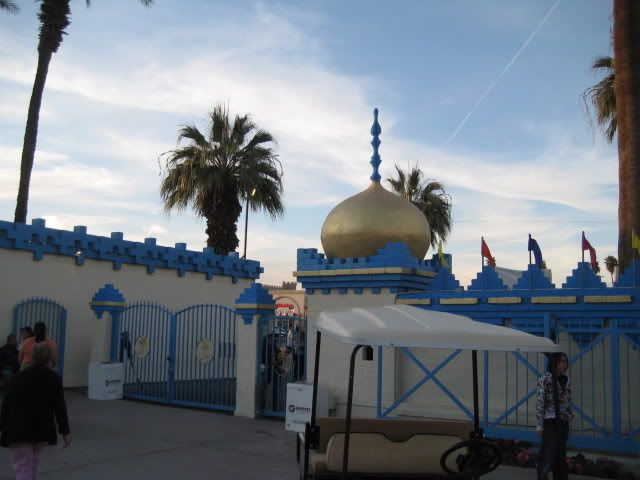
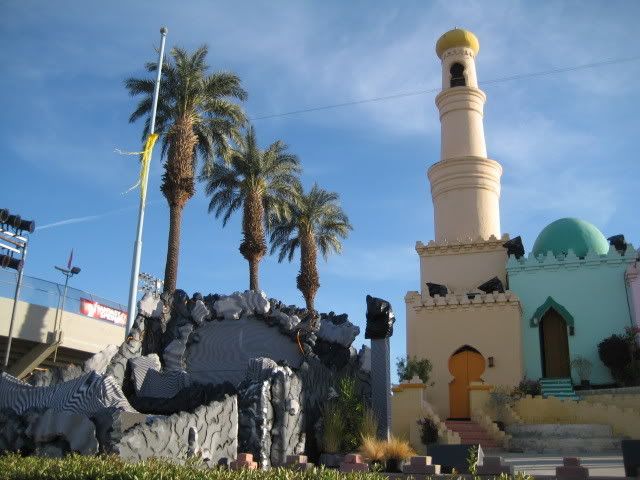
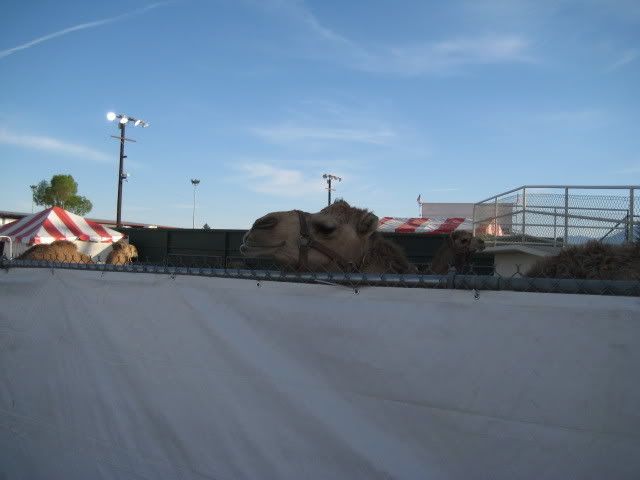
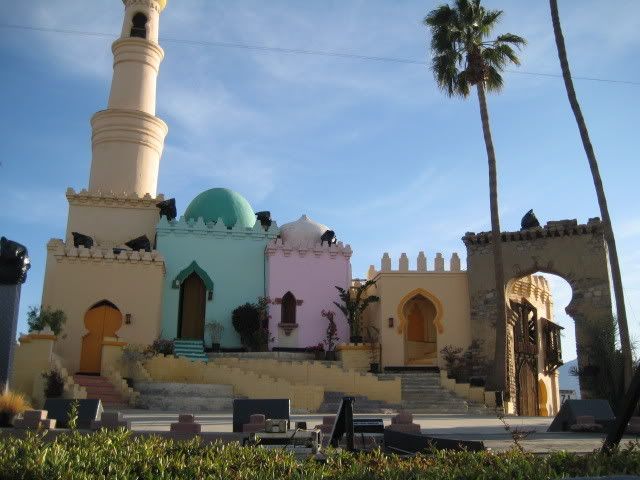
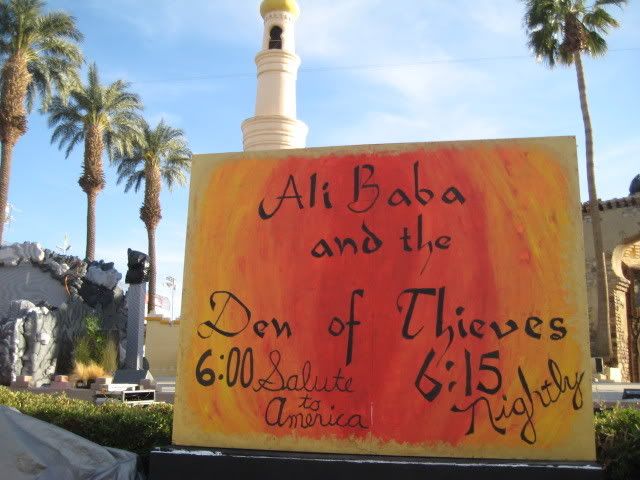


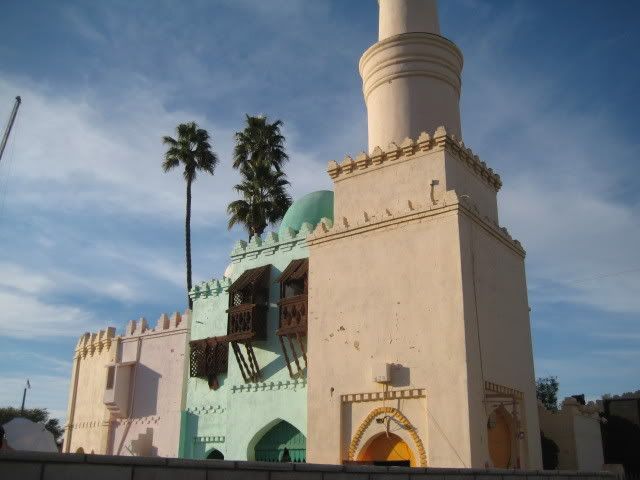
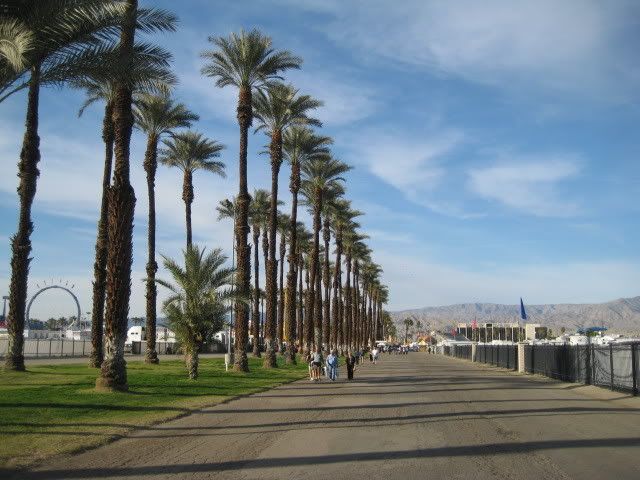

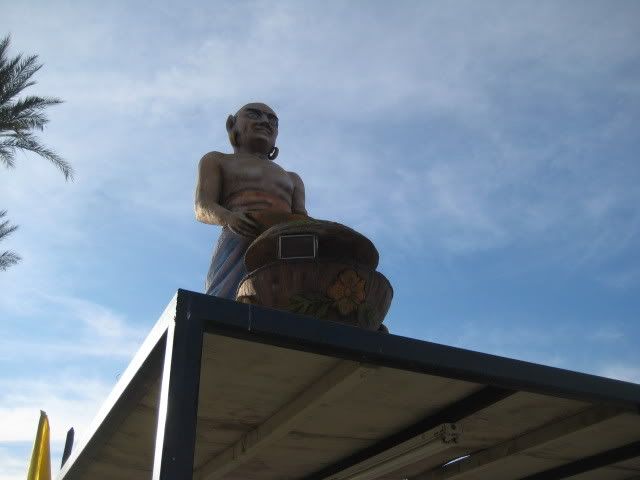
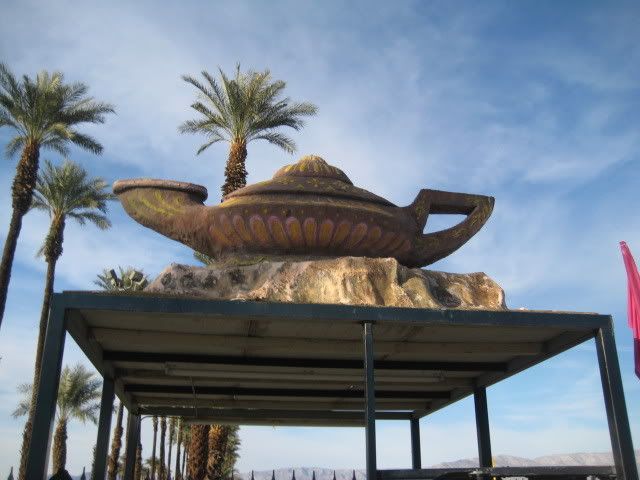
If you didn't know the area is known for its date (as in date tree) production with original tree lineages from Iraq and the Middle East. There is even a city/"census-designated place" called Mecca, California! One of the more prominant farms has a video show about the area's history and several date dessert packages and date shakes.
The fair's theme since its start in 1947 has been the 1001 Nights (aka Arabian Nights) and each year they present a live story from the collection and crown a local teen "Queen Scheherazade" along with Princess Dunyazade and a Princess Jasmine. They also have daily camel races.
This year's (2009) festival's play was "Ali Baba and the Den of Thieves" which was quite interesting to see performed in the rural arena of Indio (we may have been some of the only out-of-towners who travelled to the fair). The play incorporated several pop songs (ABBA, the Smiths, even the Turkish song "Kiss Kiss") which gave it a contemporary/ironic feel ala Moulin Rouge (the film). The production and music was quite good although several scenes felt a bit high-schooly and the microphones failed a couple of times.
The story began with the frame story of the Nights, fairly faithful and replete with the wife's infidelity and Shahriyar's subsequent beheadings (although no mention of who the original wife was unfaithful with).
The story of Ali Baba was a basic morality tale of the power of greed, money and evil vs. the power of love, with love winning in the end. In these economic times it felt appropriate.
Overall ok, a bit long at an hour and 20 mins or so. Will take some convincing to get the family to return next year I fear. We missed the show's opening prologue "A Tribute to the Troops" unfortunately.
Here are some pictures (click on them for full picture):
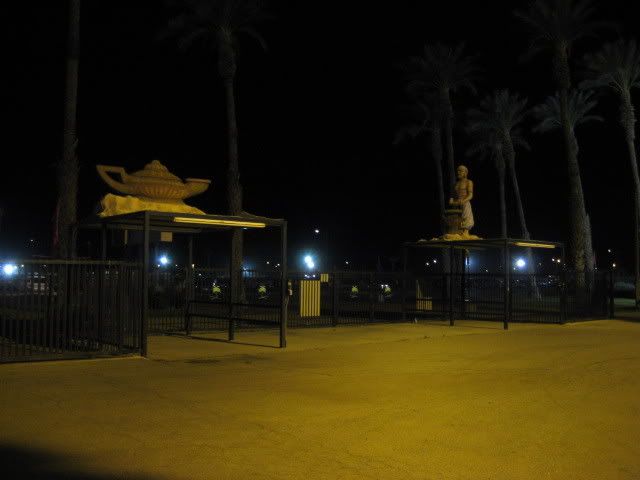 gates featuring lamp and genie
gates featuring lamp and genie















Monday, February 16, 2009
Coleridge mentions of the Nights
Here is a collection of mentions of the Arabian Nights by English Romantic Poet Samuel Taylor Coleridge. There are a lot of mentions of the Nights in just about every book ever written so it would be quite a task to compile them but I’m interested in at the least looking at some of the most prominent ones.
Quotes are from the book:
Jackson, HJ, ed. Samuel Taylor Coleridge. Oxford: Oxford UP, 1992.
[31 May 1830] Mrs Barbauld once told me that she admired the Ancient Mariner very much, but that there were two faults in it – it was improbable and had no moral. As for the probability, I owned that that might admit some question; but as to the want of a moral, I told her that in my judgement the poem had too much; and that the only, or chief fault, if I might say so, was the obtrusion of the moral sentiment so openly on the reader as a principle or cause of action in a work of such pure imagination. It ought to have had no more moral than the Arabian Nights’ tale of the merchant’s sitting down to eat dates by the side of a well, and throwing the shells aside, and lo! a genie starts up, and says he must kill the aforesaid merchant, because, one of the date shells had, it seems, put out the eye of the genie’s son. (p 594).
[To James Gillman, 9 October 1825]
My dear Friend
It is a flat’ning Thought, that the more we have seen, the less we have to say. In Youth and early Manhood the Mind and Nature are, as it were, two rival Artists, both potent Magicians, and engaged, like the King’s Daughter and the rebel Genie in the Arabian Nights’ Enternts., in sharp conflict of Conjuration – each having for its object ot turn the other into Canvas to paint on, Clay to mould, or Cabinet to contain. For a while the Mind seems to have the better in the contest, and makes of Nature what it likes; takes her Lichens and Weather-stains for Types & Printer’s Ink and prints Maps & Fac Similes of Arabic and Sanskrit Mss. on her rocks; composes Country-Dances on her moon-shiny Ripples, Fandangos on her Waves and Walzes on her Eddy-pools; transforms her Summer Gales into Harps and Harpers, Lovers’ Sighs and sighing Lovers, and her Winter Blasts into Pindaric Odes, Christabels & Ancient Mariners set to music by Beethoven, and in the insolence of triumph conjures her Clouds into Whales and Walrusses with Palanquins on their Backs, and chaces the dodging Stars in a Sky-hunt! – But alas! alas! that Nature is a wary wily long-breathed old Witch, tough-lived as a Turtle and divisible as the Polyp, repullulative in a thousand Snips and Cuttings, integra et in toto [whole and entire]! She is sure to get the better of Lady MIND in the long run, and to take her revenge too – transforms our To Day into a Canvass dead-colored to receive the dull featureless Portrait of Yesterday; not alone turns the mimic Mind, the ci-devant Sculptress with all her kaleidoscopic freaks and symmetries! into clay, but leaves it such a clay, to cast dumps or bullets in; and lastly (to end with that which suggested the beginning - ) she mocks the mind with its own metaphors, metamorphosing the Memory into a lignum vitae Es-crutoire [a Writing-desk made of the wood of life] to keep unpaid Bills & Dun’s Letters in, with Outlines that had never been filled up, MSS that never went farther than the Title-pages, and Proof-Sheets & Foul Copies of Watchmen, Friends, Aids to Reflection & other Stationary Wares that have kissed the Publisher’s Shelf with gluey Lips with all the tender intimacy of inosculation! – Finis! – And what is all this about? Why, verily, my dear Friend! the thought forced itself on me, as I was beginning to put down the first sentence of this letter, how impossible it would have been 15 or even ten years ago for me to have travelled & voyaged by Land, River, and Sea a hundred and twenty miles, with fire and water blending their souls for my propulsion, as if I had been riding on a Centaur with a Sopha for a Saddle - & yet to have nothing more to tell of it than that we had a very fine day, and ran aside the steps in Ramsgate Pier at ½ past 4 exactly, all having been well except poor Harriet, who during the middle Third of the Voyage fell into a reflecting melancholy, in the contemplation of successive specimens of her inner woman in a Wash-hand Basin. She looked pathetic; but I cannot affirm, that I observed any thing sympathetic in the countenances of her Fellow-passengers – which drew forth in a sigh from me & a sage remark, how many of our virtues originate in the fear of Death - & that while we flatter ourselves that we are melting in Christian Sensibility over the sorrows of our human Brethren and Sistreen, we are in fact, tho’ perhaps unconsciously, moved at the prospect of our own End – For who ever sincerely pities Sea-sickness, Toothache, or a fit of the Gout in a lusty Good-liver of 50? - …(p. 534)
Excerpt from
[To Thomas Poole, 9 October 1797]
At six years old I remember to have read Belisarius, Robinson Crusoe, & Philip Quarll – and then I found the Arabian Nights’ entertainments – one tale of which (the tale of a man who was compelled to seek for a pure virgin) made so deep an impression on me (I had read it in the evening while my mother was mending stockings) that I was haunted by spectres, whenever I was in the dark – and I distinctly remember the anxious & fearful eagerness, with which I used to watch the window, in which the books lay - & whenever the Sun lay upon them, I would seize it, carry it by the wall, & bask, & read - . My Father found out the effect, which these books had produced – and burnt them. – So I became a dreamer – and acquired an indisposition to all bodily activity – and I was fretful, and inordinately passionate, and as I could not play at any thing, and was slothful, I was despised & hated by the boys…
(499-500)
Quotes are from the book:
Jackson, HJ, ed. Samuel Taylor Coleridge. Oxford: Oxford UP, 1992.
[31 May 1830] Mrs Barbauld once told me that she admired the Ancient Mariner very much, but that there were two faults in it – it was improbable and had no moral. As for the probability, I owned that that might admit some question; but as to the want of a moral, I told her that in my judgement the poem had too much; and that the only, or chief fault, if I might say so, was the obtrusion of the moral sentiment so openly on the reader as a principle or cause of action in a work of such pure imagination. It ought to have had no more moral than the Arabian Nights’ tale of the merchant’s sitting down to eat dates by the side of a well, and throwing the shells aside, and lo! a genie starts up, and says he must kill the aforesaid merchant, because, one of the date shells had, it seems, put out the eye of the genie’s son. (p 594).
[To James Gillman, 9 October 1825]
My dear Friend
It is a flat’ning Thought, that the more we have seen, the less we have to say. In Youth and early Manhood the Mind and Nature are, as it were, two rival Artists, both potent Magicians, and engaged, like the King’s Daughter and the rebel Genie in the Arabian Nights’ Enternts., in sharp conflict of Conjuration – each having for its object ot turn the other into Canvas to paint on, Clay to mould, or Cabinet to contain. For a while the Mind seems to have the better in the contest, and makes of Nature what it likes; takes her Lichens and Weather-stains for Types & Printer’s Ink and prints Maps & Fac Similes of Arabic and Sanskrit Mss. on her rocks; composes Country-Dances on her moon-shiny Ripples, Fandangos on her Waves and Walzes on her Eddy-pools; transforms her Summer Gales into Harps and Harpers, Lovers’ Sighs and sighing Lovers, and her Winter Blasts into Pindaric Odes, Christabels & Ancient Mariners set to music by Beethoven, and in the insolence of triumph conjures her Clouds into Whales and Walrusses with Palanquins on their Backs, and chaces the dodging Stars in a Sky-hunt! – But alas! alas! that Nature is a wary wily long-breathed old Witch, tough-lived as a Turtle and divisible as the Polyp, repullulative in a thousand Snips and Cuttings, integra et in toto [whole and entire]! She is sure to get the better of Lady MIND in the long run, and to take her revenge too – transforms our To Day into a Canvass dead-colored to receive the dull featureless Portrait of Yesterday; not alone turns the mimic Mind, the ci-devant Sculptress with all her kaleidoscopic freaks and symmetries! into clay, but leaves it such a clay, to cast dumps or bullets in; and lastly (to end with that which suggested the beginning - ) she mocks the mind with its own metaphors, metamorphosing the Memory into a lignum vitae Es-crutoire [a Writing-desk made of the wood of life] to keep unpaid Bills & Dun’s Letters in, with Outlines that had never been filled up, MSS that never went farther than the Title-pages, and Proof-Sheets & Foul Copies of Watchmen, Friends, Aids to Reflection & other Stationary Wares that have kissed the Publisher’s Shelf with gluey Lips with all the tender intimacy of inosculation! – Finis! – And what is all this about? Why, verily, my dear Friend! the thought forced itself on me, as I was beginning to put down the first sentence of this letter, how impossible it would have been 15 or even ten years ago for me to have travelled & voyaged by Land, River, and Sea a hundred and twenty miles, with fire and water blending their souls for my propulsion, as if I had been riding on a Centaur with a Sopha for a Saddle - & yet to have nothing more to tell of it than that we had a very fine day, and ran aside the steps in Ramsgate Pier at ½ past 4 exactly, all having been well except poor Harriet, who during the middle Third of the Voyage fell into a reflecting melancholy, in the contemplation of successive specimens of her inner woman in a Wash-hand Basin. She looked pathetic; but I cannot affirm, that I observed any thing sympathetic in the countenances of her Fellow-passengers – which drew forth in a sigh from me & a sage remark, how many of our virtues originate in the fear of Death - & that while we flatter ourselves that we are melting in Christian Sensibility over the sorrows of our human Brethren and Sistreen, we are in fact, tho’ perhaps unconsciously, moved at the prospect of our own End – For who ever sincerely pities Sea-sickness, Toothache, or a fit of the Gout in a lusty Good-liver of 50? - …(p. 534)
Excerpt from
[To Thomas Poole, 9 October 1797]
At six years old I remember to have read Belisarius, Robinson Crusoe, & Philip Quarll – and then I found the Arabian Nights’ entertainments – one tale of which (the tale of a man who was compelled to seek for a pure virgin) made so deep an impression on me (I had read it in the evening while my mother was mending stockings) that I was haunted by spectres, whenever I was in the dark – and I distinctly remember the anxious & fearful eagerness, with which I used to watch the window, in which the books lay - & whenever the Sun lay upon them, I would seize it, carry it by the wall, & bask, & read - . My Father found out the effect, which these books had produced – and burnt them. – So I became a dreamer – and acquired an indisposition to all bodily activity – and I was fretful, and inordinately passionate, and as I could not play at any thing, and was slothful, I was despised & hated by the boys…
(499-500)
Lyons Review focusing on translation - Elspeth Barker
A review of the 2009 Lyons edition of the Nights focusing on its translations and past translations and their issues. I agree with much of what the reviewer says.
It's from the Independent (pasted below):
link: http://www.independent.co.uk/arts-entertainment/books/reviews/the-arabian-nights-tales-of-1001-nights-trs-malcolm-c-lyons-1607007.html
Penguin £125
The Arabian Nights: Tales of 1001 nights, trs Malcolm C Lyons
A fairy-tale classic gets a modern makeover, but don't bin its fusty predecessors just yet
Reviewed by Elspeth Barker
Sunday, 15 February 2009
In his witty essay on the translators of the 1001 Nights, Borges celebrates a hostile dynasty, each scion striving to annihilate his predecessor. There are so many manuscripts to choose from, none definitive, representing a fantastical melange of tales preserved, embroidered, lost and reinvented by countless oral storytellers, Arabic, Persian, Indian – and French.
Antoine Galland, the first European translator, in the 18th century, is thought to have created two of the most famous stories, Aladdin and Ali Baba, himself. JC Mardrus's French version of 1899 (meticulously translated into English by Powys Mathers) has been hugely criticised for its delightful additional details – a dish of rice cream comes from him "powdered with sugar and cinnamon", while the Arabic "girl" may become "an enchanting child". Why not? This is the tradition of the storyteller. A contemporary translator, Husain Haddawy, recalls stories from his childhood in Baghdad: "As the embers glowed in the dim light ... she would spin the yarn leisurely, amplifying here and interpolating there, episodes I recognised from other stories." So it goes on. Everything is an aide-memoire for something else.
This new version of the Nights by Malcolm C Lyons is the first direct translation into English of the Calcutta II recension since Sir Richard Burton's famous 19th-century version. The three volumes bear introductions by Robert Irwin, who rises to Borges' prescription and casts scorn on earlier translations, though Lyons himself notes debts to Haddawy and to Enno Littmann, the German scholar derided by Borges for his literalism: "Like Washington, he cannot tell a lie."
If one were to find fault with Lyons' monumental achievement, it would be in the painstaking plainness of his diction. Like Haddawy, Lyons falls often into linguistic traps that are avoided by the exuberant Mardrus and Mathers. Instead of "cripple" or "lame" (traditional fairy-tale adjectives), Haddawy writes "paraplegic" while Lyons has "semi-paralysed". Lyons also consistently translates the common Arabic zib and kis as "penis" and "vagina". The cumulative effect is clinical, jarringly out of place in the perfumed chambers and ghostly gardens of the Nights.
In the tale of the second barber, a young man must gratify a drunken admirer. Mardrus/Mathers gets the right tone: "The old woman came up to him and said, 'Now you must run after the dear young lady and catch her. It is her custom, when heated by dance and wine, to undress naked and not to give herself to her lover until she has been able to examine his bare limbs, his rampant zabb, and the agility of his running. You must follow her from room to room, with your zabb in the ascendant, until you catch her. That is the only way she will be mounted."
Lyons has: "'Now,' said the old woman, 'you have achieved your goal. There will be no more blows and there is only one thing left. It is a habit of my mistress that, when she is drunk, she will not let anyone have her until she has stripped off her clothes, including her harem trousers, and is entirely naked. Then she will tell you to remove your own clothes and to start running, while she runs in front of you as though she was trying to escape from you. You must follow her from place to place, until you have an erection, and she will then let you take her.'"
I don't want to seem sex-obsessed, but in a medieval fairy tale, albeit for grown-ups, men do not have erections, they have rampant (or even rampaging) zabbs. And to continue the theme, inevitable in this saga, in the story of a Prince "Semi-Petrified" for Lyons, "Ensorcelled" for Burton, a lover lamenting the unpunctuality of his mistress, says, according to Lyons, "I will never again keep company with you or join my body to yours," but according to Burton, shouts "nor will I glue my body to your body, and strum and belly-bump". Which threat carries the more weight? Lyons mentions a ruined city "echoing to the screech of owls and the cawing of crows"; fine enough, but for Burton it is a place where "raven should croak and howlet hoot". Divine. Unfortunately Burton also says things such as "verily this is a matter whereanent silence cannot be kept". Verily, 'twas time for a new translation.
Yet the English reader may not be so badly served by the now-unfashionable Mardrus-Mathers version. Mathers is championed by the poet Tony Harrison, and Mardrus's admirers have included Gide, Proust, Borges and Joyce. As even their sternest critics admit, Mardrus and Mathers come closest to conveying the experience of a medieval Cairo storyteller, albeit at the cost of strict fidelity. Mardrus also dispenses with minor tales he finds dull, replacing them with others he likes better. A case in point is "The Tale of the Sea Rose of the Girl of China", remarkable for its transsexual subplot.
Scholars universally accept the claim made by Mardrus's enemy, Victor Chauvin, that Mardrus appropriated this tale from a Victorian source. But a little literary detective work on our part reveals that the source of this story is the Sanskrit Mahabharata, which dates from more than a millennium before the earliest manuscript of the Arabian Nights. Who wins on pedigree?
Scholars object to Mardrus's adornment in passages such as the iconic first description of Scheherazade, where he adds an extra line of praise. Lyons here deletes a line which is considered by Haddawy, Burton and Payne, to be correct.
Two final quibbles with Lyons: the "index" is an unalphabetised table of contents, provokingly placed at the back of the book, and page headers give the number rather than the name of the tale.
Despite these caveats, every aficionado will want to add Lyons to a rickety shelf which ideally will also contain Mardrus/Mathers, Haddawy, and the peerless Arabian Nights Encyclopedia by Ulrich Marzolph and Richard van Leeuwen, which is almost as much fun to dip into as the Nights themselves. Doughty Burton will serve to prop the whole thing up.
It's from the Independent (pasted below):
link: http://www.independent.co.uk/arts-entertainment/books/reviews/the-arabian-nights-tales-of-1001-nights-trs-malcolm-c-lyons-1607007.html
Penguin £125
The Arabian Nights: Tales of 1001 nights, trs Malcolm C Lyons
A fairy-tale classic gets a modern makeover, but don't bin its fusty predecessors just yet
Reviewed by Elspeth Barker
Sunday, 15 February 2009
In his witty essay on the translators of the 1001 Nights, Borges celebrates a hostile dynasty, each scion striving to annihilate his predecessor. There are so many manuscripts to choose from, none definitive, representing a fantastical melange of tales preserved, embroidered, lost and reinvented by countless oral storytellers, Arabic, Persian, Indian – and French.
Antoine Galland, the first European translator, in the 18th century, is thought to have created two of the most famous stories, Aladdin and Ali Baba, himself. JC Mardrus's French version of 1899 (meticulously translated into English by Powys Mathers) has been hugely criticised for its delightful additional details – a dish of rice cream comes from him "powdered with sugar and cinnamon", while the Arabic "girl" may become "an enchanting child". Why not? This is the tradition of the storyteller. A contemporary translator, Husain Haddawy, recalls stories from his childhood in Baghdad: "As the embers glowed in the dim light ... she would spin the yarn leisurely, amplifying here and interpolating there, episodes I recognised from other stories." So it goes on. Everything is an aide-memoire for something else.
This new version of the Nights by Malcolm C Lyons is the first direct translation into English of the Calcutta II recension since Sir Richard Burton's famous 19th-century version. The three volumes bear introductions by Robert Irwin, who rises to Borges' prescription and casts scorn on earlier translations, though Lyons himself notes debts to Haddawy and to Enno Littmann, the German scholar derided by Borges for his literalism: "Like Washington, he cannot tell a lie."
If one were to find fault with Lyons' monumental achievement, it would be in the painstaking plainness of his diction. Like Haddawy, Lyons falls often into linguistic traps that are avoided by the exuberant Mardrus and Mathers. Instead of "cripple" or "lame" (traditional fairy-tale adjectives), Haddawy writes "paraplegic" while Lyons has "semi-paralysed". Lyons also consistently translates the common Arabic zib and kis as "penis" and "vagina". The cumulative effect is clinical, jarringly out of place in the perfumed chambers and ghostly gardens of the Nights.
In the tale of the second barber, a young man must gratify a drunken admirer. Mardrus/Mathers gets the right tone: "The old woman came up to him and said, 'Now you must run after the dear young lady and catch her. It is her custom, when heated by dance and wine, to undress naked and not to give herself to her lover until she has been able to examine his bare limbs, his rampant zabb, and the agility of his running. You must follow her from room to room, with your zabb in the ascendant, until you catch her. That is the only way she will be mounted."
Lyons has: "'Now,' said the old woman, 'you have achieved your goal. There will be no more blows and there is only one thing left. It is a habit of my mistress that, when she is drunk, she will not let anyone have her until she has stripped off her clothes, including her harem trousers, and is entirely naked. Then she will tell you to remove your own clothes and to start running, while she runs in front of you as though she was trying to escape from you. You must follow her from place to place, until you have an erection, and she will then let you take her.'"
I don't want to seem sex-obsessed, but in a medieval fairy tale, albeit for grown-ups, men do not have erections, they have rampant (or even rampaging) zabbs. And to continue the theme, inevitable in this saga, in the story of a Prince "Semi-Petrified" for Lyons, "Ensorcelled" for Burton, a lover lamenting the unpunctuality of his mistress, says, according to Lyons, "I will never again keep company with you or join my body to yours," but according to Burton, shouts "nor will I glue my body to your body, and strum and belly-bump". Which threat carries the more weight? Lyons mentions a ruined city "echoing to the screech of owls and the cawing of crows"; fine enough, but for Burton it is a place where "raven should croak and howlet hoot". Divine. Unfortunately Burton also says things such as "verily this is a matter whereanent silence cannot be kept". Verily, 'twas time for a new translation.
Yet the English reader may not be so badly served by the now-unfashionable Mardrus-Mathers version. Mathers is championed by the poet Tony Harrison, and Mardrus's admirers have included Gide, Proust, Borges and Joyce. As even their sternest critics admit, Mardrus and Mathers come closest to conveying the experience of a medieval Cairo storyteller, albeit at the cost of strict fidelity. Mardrus also dispenses with minor tales he finds dull, replacing them with others he likes better. A case in point is "The Tale of the Sea Rose of the Girl of China", remarkable for its transsexual subplot.
Scholars universally accept the claim made by Mardrus's enemy, Victor Chauvin, that Mardrus appropriated this tale from a Victorian source. But a little literary detective work on our part reveals that the source of this story is the Sanskrit Mahabharata, which dates from more than a millennium before the earliest manuscript of the Arabian Nights. Who wins on pedigree?
Scholars object to Mardrus's adornment in passages such as the iconic first description of Scheherazade, where he adds an extra line of praise. Lyons here deletes a line which is considered by Haddawy, Burton and Payne, to be correct.
Two final quibbles with Lyons: the "index" is an unalphabetised table of contents, provokingly placed at the back of the book, and page headers give the number rather than the name of the tale.
Despite these caveats, every aficionado will want to add Lyons to a rickety shelf which ideally will also contain Mardrus/Mathers, Haddawy, and the peerless Arabian Nights Encyclopedia by Ulrich Marzolph and Richard van Leeuwen, which is almost as much fun to dip into as the Nights themselves. Doughty Burton will serve to prop the whole thing up.
Sunday, February 15, 2009
2009 Riverside County Date Festival - Indio
The Date Festival is up and running in Indio, CA until Feb 22.
If you haven't been, you must give it a visit if only to see contemporary re-imaginings of American pop Orientalism at its finest, including a daily Arabian Nights show, date ice cream shakes and camel races.
I'll try and get over there next weekend and post some pictures.
Here is an article (also I pasted it below) from the Desert News about opening day:
http://www.mydesert.com/article/20090215/EVENTS06/902150333
Information about the festival:
Food, Fun and Entertainment
What: Riverside County Fair and National Date Festival
When: Continuing today until Feb. 22
Hours: 10 a.m to 10 p.m. On weekends the carnival is open until midnight.
Where: Riverside County Fairgrounds, 82-503 Highway 111, Indio
Cost: $8 general admission, $7 for seniors age 55 and older, and $6 for children ages 5 to 12. Children younger than 5 admitted free.
Parking: $7
Information: www.datefest.org or 800-811-3247
Arabian Nights celebrates music, dance, costumes
Aldrich M. Tan • The Desert Sun • February 15, 2009
When the sun goes down, the spotlight rises on the mid-sized Arabian Nights set for the Riverside County Fair and National Date Festival.
For months, the set remained unused on the empty fairgrounds in Indio.
But during the fair, the stage comes alive with a nightly pageant full of music, dance, and shimmering costumes.
The Arabian Nights-themed musical is at 6:15 p.m. nightly and free with fair admission.
It is a major part of the festival's tradition, said Richard De Haven, one of the show's producers.
“It is one the oldest shows in the valley,” De Haven said.
Each year's show focuses on a different tale from “One Thousand and One Nights,” De Haven said.
This year's tale is “Ali Baba and the Den of Thieves.”
The pageant organizers installed a large cave on the stage that contains at least 100 shimmering lights specifically for the performance, De Haven said.
Auditions for the show took place in October, De Haven said. The rehearsals started on weekends in January.
The performance starts with an American salute to honor the military, De Haven said.
On opening night, the 158th Battalion of California Cadet Corps from Indio High School presented the colors.
“This is good for my students,” Battalion Lt. Ed Ogimachi said. “All my students are very patriotic and this is to show they are proud of their school.”
Leroy Vesper, 73, stood up and saluted as the U.S. Air Force anthem was played on stage.
Vesper, a winter resident of Palm Desert, said he served in the Air Force for 40 years.
“I was pleasantly surprised,” he said. “This was wonderful.”
The pageant begins following an introduction by Queen Scheherazade Madi DiPietro, Princess Jasmine Amariz Mendoza, and Princess Dunyazade Stacy Jones.
The Ali Baba tale has been modified from the original to be less violent, De Haven said.
If you haven't been, you must give it a visit if only to see contemporary re-imaginings of American pop Orientalism at its finest, including a daily Arabian Nights show, date ice cream shakes and camel races.
I'll try and get over there next weekend and post some pictures.
Here is an article (also I pasted it below) from the Desert News about opening day:
http://www.mydesert.com/article/20090215/EVENTS06/902150333
Information about the festival:
Food, Fun and Entertainment
What: Riverside County Fair and National Date Festival
When: Continuing today until Feb. 22
Hours: 10 a.m to 10 p.m. On weekends the carnival is open until midnight.
Where: Riverside County Fairgrounds, 82-503 Highway 111, Indio
Cost: $8 general admission, $7 for seniors age 55 and older, and $6 for children ages 5 to 12. Children younger than 5 admitted free.
Parking: $7
Information: www.datefest.org or 800-811-3247
Arabian Nights celebrates music, dance, costumes
Aldrich M. Tan • The Desert Sun • February 15, 2009
When the sun goes down, the spotlight rises on the mid-sized Arabian Nights set for the Riverside County Fair and National Date Festival.
For months, the set remained unused on the empty fairgrounds in Indio.
But during the fair, the stage comes alive with a nightly pageant full of music, dance, and shimmering costumes.
The Arabian Nights-themed musical is at 6:15 p.m. nightly and free with fair admission.
It is a major part of the festival's tradition, said Richard De Haven, one of the show's producers.
“It is one the oldest shows in the valley,” De Haven said.
Each year's show focuses on a different tale from “One Thousand and One Nights,” De Haven said.
This year's tale is “Ali Baba and the Den of Thieves.”
The pageant organizers installed a large cave on the stage that contains at least 100 shimmering lights specifically for the performance, De Haven said.
Auditions for the show took place in October, De Haven said. The rehearsals started on weekends in January.
The performance starts with an American salute to honor the military, De Haven said.
On opening night, the 158th Battalion of California Cadet Corps from Indio High School presented the colors.
“This is good for my students,” Battalion Lt. Ed Ogimachi said. “All my students are very patriotic and this is to show they are proud of their school.”
Leroy Vesper, 73, stood up and saluted as the U.S. Air Force anthem was played on stage.
Vesper, a winter resident of Palm Desert, said he served in the Air Force for 40 years.
“I was pleasantly surprised,” he said. “This was wonderful.”
The pageant begins following an introduction by Queen Scheherazade Madi DiPietro, Princess Jasmine Amariz Mendoza, and Princess Dunyazade Stacy Jones.
The Ali Baba tale has been modified from the original to be less violent, De Haven said.
Saturday, February 14, 2009
Alf Laila wa Laila Radio Shows Online
Moti passes this link to the Internet Archive which features scores of radio shows from Egypt centered around tales from the 1001 Nights.
Even if you don't speak Arabic they will be nice to listen to the rhythms and rhymes of the stories and the storytellers.
Link:
http://www.archive.org/details/ArabianNights_Radio_Of_Cairo
Even if you don't speak Arabic they will be nice to listen to the rhythms and rhymes of the stories and the storytellers.
Link:
http://www.archive.org/details/ArabianNights_Radio_Of_Cairo
Tuesday, February 10, 2009
The Arabian Nights in Historical Context

A new academic collection of essays on the Nights has been published by Oxford University Press.
It is quite expensive at about $100 but is also available via libraries. I've ordered a copy through my library's "Inter-library loan" system. If you aren't a student or university affiliated you can usually purchase a decently priced library membership at a local university which will typically allow you to access online academic databases and also let you borrow books through the host library and affiliated libraries.
Here is the link to the publisher's site and some information from the site about the book:
http://www.oup.com/us/catalog/general/subject/LiteratureEnglish/WorldLiterature/Anthologies/?view=usa&ci=9780199554157
The Arabian Nights in Historical Context
Between East and West
Saree Makdisi and Felicity Nussbaum
ISBN13: 9780199554157
ISBN10: 0199554153
hardback, 300 pages Dec 2008, In Stock Price:$99.00 (06)
Description
Alf layla wa layla (known in English as A Thousand and One Nights or The Arabian Nights) changed the world on a scale unrivalled by any other literary text. Inspired by a fourteenth-century Syrian manuscript, the appearance of Antoine Galland's twelve-volume Mille et Une Nuit s in English translation (1704-1717), closely followed by the Grub Street English edition, drew the text into European circulation.
Over the following three hundred years, a widely heterogeneous series of editions, compilations, translations, and variations circled the globe to reveal the absorption of The Arabian Nights into English, Continental, and global literatures, and its transformative return to modern Arabic literature, where it now enjoys a degree of prominence that it had never attained during the classical period.
Beginning with a thorough introduction situating The Arabian Nights in its historical and cultural contexts-and offering a fresh examination of the text's multiple locations in the long history of modern Orientalism--this collection of essays by noted scholars from "East," "West," and in-between reassesses the influence of the Nights in Enlightenment and Romantic literature, as well as the text's vigorous afterlife in the contemporary Arabic novel.
Product Details
300 pages; 2 black-and-white halftones, musical samples;
ISBN13: 978-0-19-955415-7
ISBN10: 0-19-955415-3
Table of Contents
Introduction , Saree Makdisi and Felicity Nussbaum
1. Translation in the Contact Zone: Antoine Galland's Mille et une nuits: contes arabes , Madeleine Dobie
2. Cultivating the Garden: Antoine Galland's Arabian Nights in the Traditions of English Literature , Robert L. Mack
3. Playing the Second String: The Role of Dinarzade in Eighteenth-Century English Fiction , Ros Ballaster
4. Galland, Georgian Theater, and the Creation of Popular Orientalism , Bridget Orr
5. Christians in The Arabian Nights , Nabil Matar
6. White Women and Moorish Fancy in Eighteenth-Century Literature , Khalid Bekkaoui
7. William Beckford's Vathek and the Uses of Oriental Reenactment , Donna Landry
8. The peculiar character of the Arabian Tale: William Beckford and The Arabian Nights , James Watt
9. Coleridge and the Oriental Tale , Tim Fulford
10. The Adventure Chronotope and the Oriental Xenotrope: Galland, Sheridan, and Joyce Domesticate The Arabian Nights , Srinivas Aravamudan
11. Under the Spell of Magic: The Oriental Tale in Rimsky-Korsakov's Scheherazade , Nasser Al-Taee
12. The Influence of The Arabian Nights on the Contemporary Arabic Novel , Maher Jarrar
Sunday, February 8, 2009
Mahdi, Haddawy & Burton Compared II
These quotes are from the Fisherman/Jinni/Ensorcelled Prince series of stories:
Note on the Arabic: Several words are misspelled because of the original manuscript but I’ve copied them as they are in Mahdi’s manuscript (ie tuma instead of thuma and no dots below the ya, etc.).
Note Burton’s description of the Prince’s lover and its crudeness, which is nowhere near the same in Mahdi or in Haddawy (although the latter two are different, Haddawy translates as “black man” the Arabic for “black slave”). I’ll have to take a look at some more Arabic texts in order to get a better idea for how far off base Burton took his translation.
Fisherman and the Jinni
Burton – “Now when the Sultan heard the mournful voice he sprang to his feet; and, following the sound, found a curtain let down over a chamber-door. He raised it and saw behind it a young man sitting upon a couch about a cubit above the ground; and he fair to the sight, a well shaped wight, with eloquence dight; his forehead was flower-white, his cheek rosy bright, and a mole on his cheek-breadth like an ambergris mite; even as the poet doth indite:” (68)
Haddawy – “When the king heard the lamentation and the verses, he rose and moved toward the source of the voice until he came to a doorway behind a curtain, and when he lifted the curtain, he saw at the upper end of the room a young man sitting on a chair that rose about twenty inches above the floor. He was a handsome young man, with a full figure, clear voice, radiant brow, bright face, downy beard, and ruddy cheeks, graced with a mole like a speck of amber, just as the poet describes it:” (54-5).
Note on the Arabic: Several words are misspelled because of the original manuscript but I’ve copied them as they are in Mahdi’s manuscript (ie tuma instead of thuma and no dots below the ya, etc.).
Note Burton’s description of the Prince’s lover and its crudeness, which is nowhere near the same in Mahdi or in Haddawy (although the latter two are different, Haddawy translates as “black man” the Arabic for “black slave”). I’ll have to take a look at some more Arabic texts in order to get a better idea for how far off base Burton took his translation.
Fisherman and the Jinni
Burton – “Now when the Sultan heard the mournful voice he sprang to his feet; and, following the sound, found a curtain let down over a chamber-door. He raised it and saw behind it a young man sitting upon a couch about a cubit above the ground; and he fair to the sight, a well shaped wight, with eloquence dight; his forehead was flower-white, his cheek rosy bright, and a mole on his cheek-breadth like an ambergris mite; even as the poet doth indite:” (68)
Haddawy – “When the king heard the lamentation and the verses, he rose and moved toward the source of the voice until he came to a doorway behind a curtain, and when he lifted the curtain, he saw at the upper end of the room a young man sitting on a chair that rose about twenty inches above the floor. He was a handsome young man, with a full figure, clear voice, radiant brow, bright face, downy beard, and ruddy cheeks, graced with a mole like a speck of amber, just as the poet describes it:” (54-5).
"فلما سمح الملك الشعر والبكا نهض قايماً وتتبع الصوت وجد ستراً مرخى على باب مجلس, فشاله ونظر وادا فى صدر المجلس صبياً جالس على كرسى مرتفعاً عن الارض مقدار دراع وهو شاباٌ مليح وقداً رجيح ولسان فصيح, بجبين ازهر ووجه اقمر وعدار اخضر وخدٍ احمر وشامه عليه كقرص عنبر, كما قال الشاعر فيها
(Mahdi 113-4)
This description of the ensorcelled prince in Arabic seems best encapsulated here by Burton’s rhyming English adjectives, although it sounds a bit flowery and put on – I think that was the point here. In Haddawy’s version it is much less poetic and more straight forward in its description, which for me loses something of the original’s playfulness.
Tale of the Ensorcelled Prince
The Prince’s servants gossip:
Mahdi – 116
This description of the ensorcelled prince in Arabic seems best encapsulated here by Burton’s rhyming English adjectives, although it sounds a bit flowery and put on – I think that was the point here. In Haddawy’s version it is much less poetic and more straight forward in its description, which for me loses something of the original’s playfulness.
Tale of the Ensorcelled Prince
The Prince’s servants gossip:
Mahdi – 116
"الا تعمل له فى القدح الشرب الدى يبات عليه مرقد وتسقيه له فيرقد ويصير هو والميت سوا, وتخرج تغيب الى الفجر, ولما تاتى تبخر ببخور عند انفه يشمه فيستيقض, فيا خصارت"
Burton - “Nay, more, doth she not drug every night the cup she giveth him to drink before sleep-time, and put Bhang into it? So he sleepeth and wotteth not whither she goeth, nor what she doeth; but we know that after giving him the drugged wine, she donneth her richest raiment and perfumeth herself and then she fareth out from him to be away till break of day; then she cometh to him, and burneth a pastille under his nose and he awaketh from his deathlike sleep.” (70-1).
Haddawy - “No. She places a sleeping potion in the last drink he takes, offers him the cup, and when he drinks it, he sleeps like a dead man. Then she leaves him and stays out till dawn. When she returns, she burns incense under his nose, and when he inhales it, he wakes up. What a pity!” (57)
Here it seems that Burton is way off in his own corner but again it might be that he was using a different source for his translation, although the deliberate archaic language seems strangely incorporated here. Here Haddawy and the Arabic are closer than before.
The Prince’s wife’s lover:
Mahdi – 117
وتسلقت انا سطح القبه واشرفت عليهم وادا ببنت عمى قد وقفت على عبد اسود مبتلى قاعد على قش قصب وهو لابس هدمه وشراميط فقبلت الارض بين يديه
Burton - “Lo! My fair cousin had gone in to a hideous negro slave with his upper lip like the cover of a pot, and his lower like an open pot; lips which might sweep up sand from the gravel-floor of the cot. He was to boot a leper and a paralytic, lying upon a strew of sugar-cane trash and wrapped in an old blanket and the foulest rags and tatters” (71).
Haddawy – “I saw my wife standing before a decrepit black man sitting on reed shavings and dressed in tatters” (57).
Not sure where Burton got this description from but I’d be very interested in finding it. Haddawy forgoes the Arabic “black slave” to settle on “black man” here. She kisses the earth in front of her lover in the Arabic but the English is not quoted here.
The Prince’s wife’s torture:
Mahdi - 121
Haddawy – “I saw my wife standing before a decrepit black man sitting on reed shavings and dressed in tatters” (57).
Not sure where Burton got this description from but I’d be very interested in finding it. Haddawy forgoes the Arabic “black slave” to settle on “black man” here. She kisses the earth in front of her lover in the Arabic but the English is not quoted here.
The Prince’s wife’s torture:
Mahdi - 121
تم انها لم يكفها دلك وما صارت حالتى اليه تم انها تعرينى فى كل يوم وتضربنى بالصوت مايه جلده حتى يسيل دمى وتتهرى اكتافى, تم تلبسنى توب شعر صفه البلاّس على نصفى الفوقانى وتلبسنى هده الاتواب الفاخره من فوق
Burton – “And every day she tortureth me and scougeth me with an hundred stripes, each of which draweth floods of blood and cutteth the skin of my shoulders to strips; and lastly she clotheth my upper half with a hair-cloth and then throweth over them these robes” (77).
Haddawy – “she strips me naked every day and gives me a hundred lashes with the whip until my back is lacerated and begins to bleed. Then she clothes my upper half with a hairshirt like a coarse rug and covers it with these luxurious garments.” (61)
Haddawy – “she strips me naked every day and gives me a hundred lashes with the whip until my back is lacerated and begins to bleed. Then she clothes my upper half with a hairshirt like a coarse rug and covers it with these luxurious garments.” (61)
Comparisons: The Tale of the Ensorcelled Prince and the Frame Story
Comparison between:
The Tale of the Ensorcelled Prince and the Frame Story
I really like the word ensorcelled by the way, it should be used more often.
Commonalities:
1. Cheating wife with black man who is beneath the wife’s “class” (frame: slave (both Shahriyar and Shahzaman, although sometimes Shahzaman’s wife goes with a cook), Prince: inhabitant of the garbage dump (not clear if he’s a slave but he’s definitely of a “lower” class).
- an aside, I’ve only heard mention of the “issue” of the black man’s role in the Nights once and I can’t remember where, but its treatment was cursory. I’m sure there are articles or books or chapters which deal with the problems inherent in the Nights and their tales for a contemporary audience who may not be as willing to allow the function of the hyper-sexual black slave man character to operate in the same way that audiences of 14th century Cairo might have, or 19th century England for that matter. It’s kind of a troubling matter because this stock figure appears quite often throughout the stories and in fact “his” role is quite important to the functioning of the tales and of the main frame story itself.
2. Tricks by the cuckolded husbands in order to get back at their wives. Frame story: While Shahzaman immediately kills his wife and the cook, Shahriyar waits, Shahriyar and his brother lie and tell Shahriyar’s wife they are going hunting and then sneak back into the palace to see the garden orgy. In the prince story the husband pretends to drink the sleeping potion/bhang drink and runs off after thinking he mortally wounds his wife’s lover instead of revealing what he knows to her (he doesn’t do so for three years!).
3. Stalling of the revenge. In the frame story there seems to be this painfully long stalling of the revenge by Shahriyar, particularly following his brother’s quick and immediate justice to his wife. The Prince story has similar stalling of the action. Both seem to draw out the drama of the tale and seem to function toward the “endlessness” of the Nights themselves.
- Shahriyar first needs to see the infraction for himself in order to mete out his justice. The Prince, likewise, hears the female servants who are fanning him tell of his own wife’s bad behavior and he also needs to know firsthand.
- Also, Shahriyar doesn’t immediately react to his wife’s infidelity, instead him and his brother go off to travel and to see if this feature of painful marriage exists anywhere else in the world (it does, in the first being they encounter). This leads to the side story of the Genie and the lady in the box, etc.
4. Women/wives as instigators. In the frame story Shahriyar’s wife calls Mas’ud down from the trees. Mas’ud is hiding in nature, in the trees. She calls him to commit adultery in her husband’s house. In the Prince story the prince’s wife seeks out her lover in nature/the outskirts of the city/garbage dump (admittedly somewhat different than a tree). The Prince’s wife also brings her lover to the Prince’s castle and also commits adultery in her husband’s house.
5. “Saved” by another man. In the frame story Shahzaman’s depression is saved by his brother’s misfortune (is that a stretch?), Shahriyar is saved by his brother telling him the truth, the two are saved by the genie’s misfortune, can we say that Shahriyar is saved by the Wazir who agrees to his daughter’s marriage to the virgin-killing king? Similarly the Prince is saved by the curious King who, upon hearing the Prince’s version of his predicament, believes him without question and goes and kills the wife’s lover and the wife herself.
6. Magic: The main magic/supernatural feature of the frame story is the genie who keeps the woman in the box on his head. There is also the story of the ox and the donkey and the dog and the rooster, these come a bit later and are told to Sharazad by her father. There is a lot of magic in the Prince story: the magical people who appear when the cooks fry up the fish (an aside – what ever happens to these people who come out of the wall? Their story and their relationship to the fish frying in the pan are tantalizingly unfinished and left hanging unresolved), the seemingly sudden magical powers of the Prince’s wife (how/where does she get these powers from? Why do they appear only after her husband discovers her and her lover and why didn’t she use them earlier to “ensorcel” her husband? Why does she turn the whole town into colored fish?
In any case, just some similarities that I noticed after reading both stories back to back. I’m sure there are others, please feel free to add some of your own.
The Tale of the Ensorcelled Prince and the Frame Story
I really like the word ensorcelled by the way, it should be used more often.
Commonalities:
1. Cheating wife with black man who is beneath the wife’s “class” (frame: slave (both Shahriyar and Shahzaman, although sometimes Shahzaman’s wife goes with a cook), Prince: inhabitant of the garbage dump (not clear if he’s a slave but he’s definitely of a “lower” class).
- an aside, I’ve only heard mention of the “issue” of the black man’s role in the Nights once and I can’t remember where, but its treatment was cursory. I’m sure there are articles or books or chapters which deal with the problems inherent in the Nights and their tales for a contemporary audience who may not be as willing to allow the function of the hyper-sexual black slave man character to operate in the same way that audiences of 14th century Cairo might have, or 19th century England for that matter. It’s kind of a troubling matter because this stock figure appears quite often throughout the stories and in fact “his” role is quite important to the functioning of the tales and of the main frame story itself.
2. Tricks by the cuckolded husbands in order to get back at their wives. Frame story: While Shahzaman immediately kills his wife and the cook, Shahriyar waits, Shahriyar and his brother lie and tell Shahriyar’s wife they are going hunting and then sneak back into the palace to see the garden orgy. In the prince story the husband pretends to drink the sleeping potion/bhang drink and runs off after thinking he mortally wounds his wife’s lover instead of revealing what he knows to her (he doesn’t do so for three years!).
3. Stalling of the revenge. In the frame story there seems to be this painfully long stalling of the revenge by Shahriyar, particularly following his brother’s quick and immediate justice to his wife. The Prince story has similar stalling of the action. Both seem to draw out the drama of the tale and seem to function toward the “endlessness” of the Nights themselves.
- Shahriyar first needs to see the infraction for himself in order to mete out his justice. The Prince, likewise, hears the female servants who are fanning him tell of his own wife’s bad behavior and he also needs to know firsthand.
- Also, Shahriyar doesn’t immediately react to his wife’s infidelity, instead him and his brother go off to travel and to see if this feature of painful marriage exists anywhere else in the world (it does, in the first being they encounter). This leads to the side story of the Genie and the lady in the box, etc.
4. Women/wives as instigators. In the frame story Shahriyar’s wife calls Mas’ud down from the trees. Mas’ud is hiding in nature, in the trees. She calls him to commit adultery in her husband’s house. In the Prince story the prince’s wife seeks out her lover in nature/the outskirts of the city/garbage dump (admittedly somewhat different than a tree). The Prince’s wife also brings her lover to the Prince’s castle and also commits adultery in her husband’s house.
5. “Saved” by another man. In the frame story Shahzaman’s depression is saved by his brother’s misfortune (is that a stretch?), Shahriyar is saved by his brother telling him the truth, the two are saved by the genie’s misfortune, can we say that Shahriyar is saved by the Wazir who agrees to his daughter’s marriage to the virgin-killing king? Similarly the Prince is saved by the curious King who, upon hearing the Prince’s version of his predicament, believes him without question and goes and kills the wife’s lover and the wife herself.
6. Magic: The main magic/supernatural feature of the frame story is the genie who keeps the woman in the box on his head. There is also the story of the ox and the donkey and the dog and the rooster, these come a bit later and are told to Sharazad by her father. There is a lot of magic in the Prince story: the magical people who appear when the cooks fry up the fish (an aside – what ever happens to these people who come out of the wall? Their story and their relationship to the fish frying in the pan are tantalizingly unfinished and left hanging unresolved), the seemingly sudden magical powers of the Prince’s wife (how/where does she get these powers from? Why do they appear only after her husband discovers her and her lover and why didn’t she use them earlier to “ensorcel” her husband? Why does she turn the whole town into colored fish?
In any case, just some similarities that I noticed after reading both stories back to back. I’m sure there are others, please feel free to add some of your own.
Friday, February 6, 2009
Pasolini - Arabian Nights
Pasolini's Arabian Nights (1974) has long been out of print but it has been sighted on the Internet here:
It's dubbed into English which detracts a bit from the enjoyment of hearing the original Italian but it's the only version I found online or anywhere besides selling for big bucks on ebay in VHS format.
Enjoy!
It's dubbed into English which detracts a bit from the enjoyment of hearing the original Italian but it's the only version I found online or anywhere besides selling for big bucks on ebay in VHS format.
Enjoy!
Thursday, February 5, 2009
Festival Ballet Providence performs Eldar Aliev’s A Thousand and One Nights
Rhode Island performance of the contemporary ballet which features the three most popular tales of the Nights: Sinbad, Aladdin, and Ali Baba, as well as the frame story.
Info on the choreographer and a video from him follows the review pasted below:
http://www.projo.com/theater/content/wk-1001_02-05-09_K9CUOTR_v15.21f1cf5.html
‘A Thousand and One leaps’ by Festival Ballet Providence
01:00 AM EST on Thursday, February 5, 2009
By Bryan Rourke
Journal Staff Writer
Perhaps a flying carpet will sweep you away. Or maybe dance will do the same.
Both are expected this weekend at Veterans Memorial Auditorium.
“I’m a choreographer, not a technician,” says Eldar Aliev. “I told my technician people that I need a flying carpet, and a flying carpet was there.”
Festival Ballet Providence presents Aliev’s A Thousand and One Nights: The Adventures of Aladdin, Sinbad & Ali Baba. The two-act ballet is regarded as inspirational and fantastical. Last year, Dance Magazine called the work “fiery and brash and raw. It’s passionate and slapstickish. Sometimes it’s even kitschy.”
Aliev, a guest choreographer from Russia who danced 13 years with the Kirov Ballet, doesn’t know the words slapstickish and kitschy. But he does know humor when he hears it. And he hears it in the score of Fikret Amirov.
“You listen to the music and you hear it. You know when the composer is smiling. You feel it.”
This is where Aliev’s choreographic inspiration began, hearing the music Amirov set to the legendary Arabian tale of Scheherazade, for which there are many versions. Festival Ballet fans know that. In 2005 and in 2007 the company presented a one-act Scheherazade by guest choreographer Gianni Di Marco.
“They are two completely different ballets,” says Mihailo Djuric, Festival’s artistic director. “They have different music and are different dramatically.”
Djuric selected Aliev’s ballet because of its “passion” and its “excitement,” and also because of its demanding dancing. Djuric saw Aliev’s A Thousand and One Nights shortly after it premiered in 1996. But he said he had to wait until he felt his company was up to the challenge of performing it.
“It’s dynamic and energetic. It’s very hard. Is it possible that someone living can do this?”
Djuric, who goes by the name of Misha, decided to see if his dancers could live to tell about it. And in early January, after a two-week Christmas break, Festival’s dancers began rehearsing Aliev’s work. One dancer said something to the effect, “Thank you, Misha. You just want to kill us.”
Actually, Aliev, who has been in Providence the last month rehearsing the company, is applying the punishment. And he doesn’t disagree that’s the word for it.
“It’s one of the most challenging dances I’ve ever danced,” Aliev says. “It was the last production I did. I danced this production and the next day I retired.”
Ballets are largely based on jumps and turns. And for this ballet, the basis is big.
“You have to match the music, and the music is so emotional and so expressive,” Aliev says. “So you have to be expressive. To do that in ballet, you have to express yourself physically, with lifts, jumps and turns — and lots of them.”
Pantomime plays no part in this ballet. The story, Aliev says, doesn’t need it.
“Everything is very clear.”
Scheherazade and other women of a particular kingdom are unfaithful. The sultan of the kingdom intends to execute them in return. But their deaths are delayed (1001 nights) by the storytelling of Scheherazade. Here, however, the ballet presents just three of those tales.
“In his music, Amirov highlights the betrayal, but he also highlights the best of women: love, wisdom and beauty. So we chose three stories of the best aspects of women.”
The first act is the betrayal. The second act is three stories: Sinbad, Aladdin and Ali Baba. And then at the end, there’s a flying carpet.
“It’s very important. It’s the cherry on top of the cake.”
Festival Ballet Providence performs Eldar Aliev’s A Thousand and One Nights: The Adventures of Aladdin, Sinbad & Ali Baba this weekend at Veterans Memorial Auditorium, One Avenue of the Arts, Providence. Shows are tomorrow and Saturday at 7:30 p.m., and Sunday at 2:30 p.m. For tickets, $20 to $65, call (401) 421-2787 or visit www.ppacri.com.
Choreographer's website: http://www.eldaraliev.com/
Video from one of his performances:
Info on the choreographer and a video from him follows the review pasted below:
http://www.projo.com/theater/content/wk-1001_02-05-09_K9CUOTR_v15.21f1cf5.html
‘A Thousand and One leaps’ by Festival Ballet Providence
01:00 AM EST on Thursday, February 5, 2009
By Bryan Rourke
Journal Staff Writer
Perhaps a flying carpet will sweep you away. Or maybe dance will do the same.
Both are expected this weekend at Veterans Memorial Auditorium.
“I’m a choreographer, not a technician,” says Eldar Aliev. “I told my technician people that I need a flying carpet, and a flying carpet was there.”
Festival Ballet Providence presents Aliev’s A Thousand and One Nights: The Adventures of Aladdin, Sinbad & Ali Baba. The two-act ballet is regarded as inspirational and fantastical. Last year, Dance Magazine called the work “fiery and brash and raw. It’s passionate and slapstickish. Sometimes it’s even kitschy.”
Aliev, a guest choreographer from Russia who danced 13 years with the Kirov Ballet, doesn’t know the words slapstickish and kitschy. But he does know humor when he hears it. And he hears it in the score of Fikret Amirov.
“You listen to the music and you hear it. You know when the composer is smiling. You feel it.”
This is where Aliev’s choreographic inspiration began, hearing the music Amirov set to the legendary Arabian tale of Scheherazade, for which there are many versions. Festival Ballet fans know that. In 2005 and in 2007 the company presented a one-act Scheherazade by guest choreographer Gianni Di Marco.
“They are two completely different ballets,” says Mihailo Djuric, Festival’s artistic director. “They have different music and are different dramatically.”
Djuric selected Aliev’s ballet because of its “passion” and its “excitement,” and also because of its demanding dancing. Djuric saw Aliev’s A Thousand and One Nights shortly after it premiered in 1996. But he said he had to wait until he felt his company was up to the challenge of performing it.
“It’s dynamic and energetic. It’s very hard. Is it possible that someone living can do this?”
Djuric, who goes by the name of Misha, decided to see if his dancers could live to tell about it. And in early January, after a two-week Christmas break, Festival’s dancers began rehearsing Aliev’s work. One dancer said something to the effect, “Thank you, Misha. You just want to kill us.”
Actually, Aliev, who has been in Providence the last month rehearsing the company, is applying the punishment. And he doesn’t disagree that’s the word for it.
“It’s one of the most challenging dances I’ve ever danced,” Aliev says. “It was the last production I did. I danced this production and the next day I retired.”
Ballets are largely based on jumps and turns. And for this ballet, the basis is big.
“You have to match the music, and the music is so emotional and so expressive,” Aliev says. “So you have to be expressive. To do that in ballet, you have to express yourself physically, with lifts, jumps and turns — and lots of them.”
Pantomime plays no part in this ballet. The story, Aliev says, doesn’t need it.
“Everything is very clear.”
Scheherazade and other women of a particular kingdom are unfaithful. The sultan of the kingdom intends to execute them in return. But their deaths are delayed (1001 nights) by the storytelling of Scheherazade. Here, however, the ballet presents just three of those tales.
“In his music, Amirov highlights the betrayal, but he also highlights the best of women: love, wisdom and beauty. So we chose three stories of the best aspects of women.”
The first act is the betrayal. The second act is three stories: Sinbad, Aladdin and Ali Baba. And then at the end, there’s a flying carpet.
“It’s very important. It’s the cherry on top of the cake.”
Festival Ballet Providence performs Eldar Aliev’s A Thousand and One Nights: The Adventures of Aladdin, Sinbad & Ali Baba this weekend at Veterans Memorial Auditorium, One Avenue of the Arts, Providence. Shows are tomorrow and Saturday at 7:30 p.m., and Sunday at 2:30 p.m. For tickets, $20 to $65, call (401) 421-2787 or visit www.ppacri.com.
Choreographer's website: http://www.eldaraliev.com/
Video from one of his performances:
Wednesday, February 4, 2009
Calcutta II online
Thanks to Moti (>http://moti-kagan.blogspot.com) for passing on the online version of Calcutta II of the Arabian Nights (1001 Nights) linked below, free and complete and in Arabic with a nice looking script too.
Unfortunately the book is scanned backwards! And it starts with the last page!
I'll try to contact Google books about it.
Here is the link to the Calcutta II online version:
http://books.google.ca/books?id=COgNAAAAYAAJ
Unfortunately the book is scanned backwards! And it starts with the last page!
I'll try to contact Google books about it.
Here is the link to the Calcutta II online version:
http://books.google.ca/books?id=COgNAAAAYAAJ
Tuesday, February 3, 2009
Comparing Mahdi to Burton and Haddawy
A few interesting comparisons of some key translations and editions of the Nights.
Some quick notes about Mahdi's manuscript/edition: The Wazir kills Shahriyar's wife and future wives.
In Mahdi the Wazir is called:
Some quick notes about Mahdi's manuscript/edition: The Wazir kills Shahriyar's wife and future wives.
In Mahdi the Wazir is called:
ابو جاريتين
Which is translated in Haddawy as "father of the two girls" but which actually (thanks Nadine) means father of the two concubines or servants (much more interesting). It's the first time I heard of the Wazir called anything other than Shahriyar's Wazir. Jariya is an old medieval word and is, according to my sources, no longer in use.
Unfortunately Google's translation (which is horrible in general for a contextually complex language like Arabic into English) of the word as "ongoing" (which would make the Wazir (Sharazad's father) named "Father of Ongoing") is incorrect and there is no word apart from the dual form of the servants/concubines.
Here are some segments of text for consideration, comparing the Arabic of Mahdi's manuscript with Haddawy's and Burton's translations. I'm interested in the way in which the translators (and Burton was using a different version than Haddawy/Mahdi) dealt with rhythm and language. Haddawy says in his introduction that he is not copying the rhymes into English because they would sound bad. I think Burton does a pretty good job of getting close to the Arabic rhythm and playfulness of the text though and Haddawy sounds relatively flat here.
Description of Shahrazad:
In Mahdi's manuscript (p 22):
وكانت الكبيره شهرازاد قد قرات الكتب والمصنفات والحكمه وكتب الطبيات وحفظت الاشعار وطالعت الاخبار وعلمت اقوال الناس وكلام الحكما والملوك, عارفه لبيبه حكيمه اديبه, قد قرت ودرت
“The older daughter, Shahrazad, had read the books of literature, philosophy, and medicine. She knew poetry by heart, had studied historical reports, and was acquainted with the sayings of men and the maxims of sages and kings. She was intelligent, knowledgeable, wise and refined. She had read and learned.” (Haddawy 11)
“Now he had two daughters, Shahrazad and Dunyazad hight, of whom the elder had perused the books, annals and legends of preceding Kings, and the stories, examples and instances of by-gone men and things; indeed it was said that she had collected a thousand books of histories relating to antique races and departed rulers. She had perused the works of the poets and knew them by heart; she had studies philosophy and the sciences, arts and accomplishments; and she was pleasant and polite, wise and witty, well read and well bred.” (Burton 14-5).
“Now he had two daughters, Shahrazad and Dunyazad hight, of whom the elder had perused the books, annals and legends of preceding Kings, and the stories, examples and instances of by-gone men and things; indeed it was said that she had collected a thousand books of histories relating to antique races and departed rulers. She had perused the works of the poets and knew them by heart; she had studies philosophy and the sciences, arts and accomplishments; and she was pleasant and polite, wise and witty, well read and well bred.” (Burton 14-5).
and the ox and the donkey:
Mahdi p 27 -
ويستعملونى من الليل الى الليل ويطلعوا بى فى الليل الى دار البقر ويلقحوا لى الفول بالطين والتبن بقصله, وابات فى الخرا والبول طول ليلتى, وانت لم تبرح فى كنش ورش ومسح ومعلف نضيف ملان تبن, وانت واقف مستريح وفى النادر حتى يعرض لصاحبنا التاجر حاجه يركبك فيها ويعود على اتره, وانت مستريح وانا تعبان, وانت نايم وانا سهران.
Haddawy – “They work me from nighttime to nighttime, take me back in the dark, offer me beans soiled with mud and hay mixed with chaff, and let me spend the night lying in urine and dung. Meanwhile you rest on well-swept, watered and smoothed ground, with a clean trough full of hay. You stand in comfort, save for the rare occasion when our master rides you to do a brief errand and returns. You are comfortable, while I am weary; you sleep, while I keep awake” (12).
Burton – “They shut me up in the byre and throw me beans and crushed-straw, mixed with dirt and chaff; and I lie in dung and filth and foul stinks through the livelong night. But thou art always lying at ease, save when it happens (and seldom enough!) that the master hath some business, when he mounts thee and rides thee to town and returns with thee forthright. So it happens that I am toiling and distrest while thou takest thine ease and thy rest; thou sleepest while I am sleepless; I hunger still while thou eatest thy fill, and I win contempt while thou winnest good will” (16-7).
Burton – “They shut me up in the byre and throw me beans and crushed-straw, mixed with dirt and chaff; and I lie in dung and filth and foul stinks through the livelong night. But thou art always lying at ease, save when it happens (and seldom enough!) that the master hath some business, when he mounts thee and rides thee to town and returns with thee forthright. So it happens that I am toiling and distrest while thou takest thine ease and thy rest; thou sleepest while I am sleepless; I hunger still while thou eatest thy fill, and I win contempt while thou winnest good will” (16-7).
1863 Bulak Online
Here is the 1863 Bulak Edition of Alf Laila wa Laila complete and online for free (in Arabic):
Volume one:
http://www.archive.org/details/alflailwalail01bulauoft
Volume two:
>http://www.archive.org/details/alflailwalail02bulauoft
Volume three:
>http://www.archive.org/details/alflailwalail03bulauoft
Voume four:
>http://www.archive.org/details/alflailwalail04bulauoft
Volume one:
http://www.archive.org/details/alflailwalail01bulauoft
Volume two:
>http://www.archive.org/details/alflailwalail02bulauoft
Volume three:
>http://www.archive.org/details/alflailwalail03bulauoft
Voume four:
>http://www.archive.org/details/alflailwalail04bulauoft
Subscribe to:
Posts (Atom)

